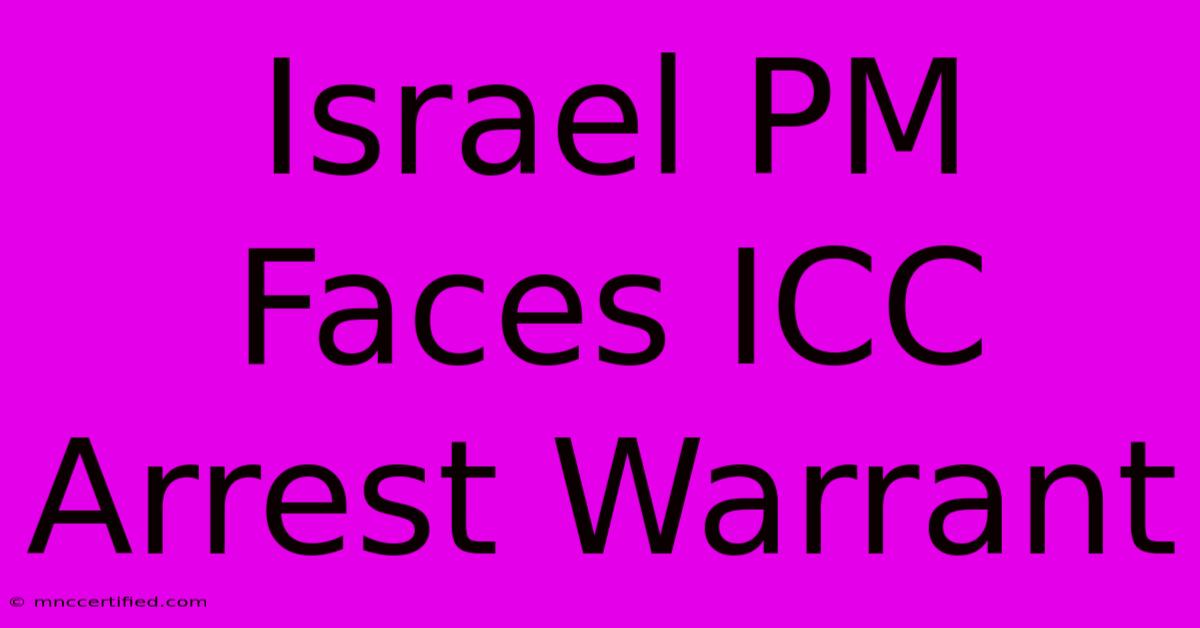Israel PM Faces ICC Arrest Warrant

Table of Contents
Israel PM Faces ICC Arrest Warrant: A Deep Dive into the International Legal Implications
The International Criminal Court's (ICC) issuance of an arrest warrant for Israeli Prime Minister Benjamin Netanyahu has sent shockwaves through international relations. This unprecedented move raises complex legal and political questions, demanding a thorough understanding of the situation's nuances. This article delves into the key aspects of this development, exploring the ICC's jurisdiction, the charges against Netanyahu, and the potential ramifications for Israel and the international community.
Understanding the ICC's Jurisdiction
The ICC is an independent international tribunal established to prosecute individuals for the gravest crimes under international law: genocide, war crimes, crimes against humanity, and the crime of aggression. Crucially, the ICC's jurisdiction is not universal. It only has authority over individuals from states that have ratified the Rome Statute, or when the UN Security Council refers a situation to the Court. Israel is not a member of the Rome Statute, a key point in the ongoing debate surrounding the legality of the warrant.
However, the ICC's jurisdiction in Palestine is a complex matter. Palestine joined the ICC in 2015, asserting its jurisdiction over territories occupied since 1967. The ICC's subsequent investigations have focused on alleged crimes committed in these territories. The legality of the ICC's involvement in this context is fiercely contested by Israel, which argues the court lacks jurisdiction over actions within its sovereign territory. This jurisdictional dispute forms the bedrock of the controversy surrounding the arrest warrant.
The Charges Against Netanyahu
While the specific details of the charges remain under seal, the ICC's investigation centers on alleged war crimes and crimes against humanity related to Israel's actions in the Palestinian territories. This includes potential investigations into the blockade of Gaza, the 2014 Gaza War, and the settlement expansion in the West Bank. The warrant itself does not explicitly outline the specific allegations against Netanyahu, highlighting the need for further transparency as the legal process unfolds. The focus is on alleged violations of international humanitarian law and international criminal law, leading to the issuing of the arrest warrant.
International Ramifications and Political Fallout
The issuance of the warrant has provoked strong reactions from both Israel and its allies. Israel has condemned the ICC's decision, calling it a politically motivated attack and vowing to resist its enforcement. This underlines the highly politicized nature of the ICC’s actions and the potential for escalating tensions in the already volatile region. The potential for international diplomatic fallout is significant. Allied nations may find themselves navigating conflicting loyalties, needing to balance their support for Israel with their commitment to international justice.
The Future of the Investigation and Potential Implications
The immediate future is uncertain. The warrant's enforcement depends on the cooperation of states where Netanyahu might travel. Countries that are members of the Rome Statute have a legal obligation to arrest and surrender him to the ICC. However, the political ramifications for any state that complies could be substantial, creating a delicate balance between legal obligations and political realities. The arrest warrant represents a significant escalation in the long-standing conflict and highlights the challenges of achieving justice in situations involving powerful states.
The ICC's actions are certain to intensify the debate on the court's legitimacy and effectiveness. This includes ongoing discussions about the role of the Security Council in referring situations to the court and the need for greater consensus on the definition and application of international law in complex geopolitical contexts. The outcome of this situation will undoubtedly shape the future of international justice and the ICC's role in addressing alleged war crimes and crimes against humanity.
Conclusion: Navigating Uncharted Waters
The arrest warrant against Benjamin Netanyahu marks a turning point in international law and the Israeli-Palestinian conflict. The legal and political implications are far-reaching, impacting the role of the ICC, the relationship between Israel and the international community, and the pursuit of justice in the context of armed conflict. Further developments in this case will be crucial in shaping the future landscape of international justice and political relations. This situation calls for careful observation and analysis as it unfolds.

Thank you for visiting our website wich cover about Israel PM Faces ICC Arrest Warrant. We hope the information provided has been useful to you. Feel free to contact us if you have any questions or need further assistance. See you next time and dont miss to bookmark.
Featured Posts
-
Jelly Rolls Houston Juvenile Visit
Nov 22, 2024
-
Two Britons Injured Five Dead In Laos Methanol Incident
Nov 22, 2024
-
Insurance Lead Management System
Nov 22, 2024
-
Rooney Coleen Head To Head Tv Ratings
Nov 22, 2024
-
Snowflake Q3 Earnings Revenue Surpasses Expectations
Nov 22, 2024